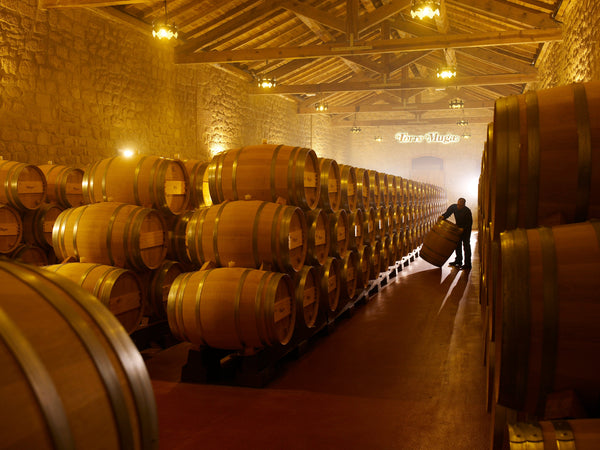
Muga
One of the most iconic places in the wine world is the Barrio de la Estación located in the city of Haro, Rioja, from where trains used to go to France carrying barrels, wine, and winemaking know-how. In fact, thanks to this train connection, the Rioja region and the region's wines are considered today alone among the classics of the wine world. In the area of the Barrio de la Estación block, there are several famous Rioja wineries, one of which is the Muga family estate founded in 1932 by Isaac Muga and Aurora Caño. Isaac Muga previously worked as a cellar master at La Rioja Alta, when he also met his future wife, Aurora. This is said to have been a very accurate taster and to be able to identify when tasting wine from which village or vineyard it was made.
The farm, which will soon celebrate its 100th anniversary, has always belonged to the Muga family. The children of Isaac Muga's sons, Manuel and Isacín, are today in charge of the estate and it really is a family business, as the winemakers in the cellar are Isacín's sons, brothers Jorge and Isaac Muga, of whom Jorge focuses on red wines and Isaac on the production of white and rosé wines. Their cousins, Manuel's children Manu, Juan, Eduardo and Ana focus on farm management, communication and wine sales. Less than 20% of Rioja's wineries are family-owned, so for Muga, family and common shared values are everything.
The family space was only moved to the current rooms in 1970, although when you visit the basement, it seems to be at least as old as the other rooms in the block. Muga was the first farm in the area to open its doors to visitors in 1975. Today, farm visits are one of Bodegas Muga's most significant investments, as the winery may be visited by up to 40,000 people a year. 70% of the farm's grapes are obtained from their own vineyards covering approximately 300 hectares, which are mainly located in the Rioja Alta area. Some of the Viura and Garnacha grapes are bought 30 kilometers from the Najerilla valley from long-term contract farmers, but the other vineyards are located in near the farm. The grape repertoire also includes Tempranillo, Mazuelo or Carignan, Graciano and Malvasia. The average age of the vineyards is about 50 years. Satellite maps are used to help garden work, with which the vitality of the vines and the threat of disease can be monitored based on the color of the leaves. The maps also help with harvesting, when the grapes from different plots can be separated and processed separately.
The wines begin their fermentation in large oak vats, from where, after fermentation and post-fermentation maceration lasting about 15 days, they are placed in smaller barrels for natural malolactic fermentation and maturation. Muga employs up to four barrel makers, one of whom is responsible for the production of large oak barrels and the rest for the production of classic 225-liter barrique barrels. Isaac Muga buys oak trees together with the farm's barrel master from the French forests of Alliers, Troncais and Nevers. After the barrels have been used for five years, they are sold on to whiskey production. All in all, the farm's winemaking is very traditional. The wines are decanted by gravity under candlelight, and the red wines are further clarified using egg white in a process that lasts up to 1.5 months. Up to 40 people work in the cellar, at least three times the number compared to other wineries of the same size.
The farm's total annual production is about 1.5 million bottles.





